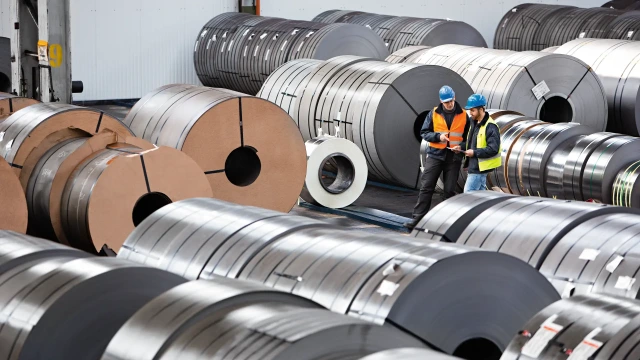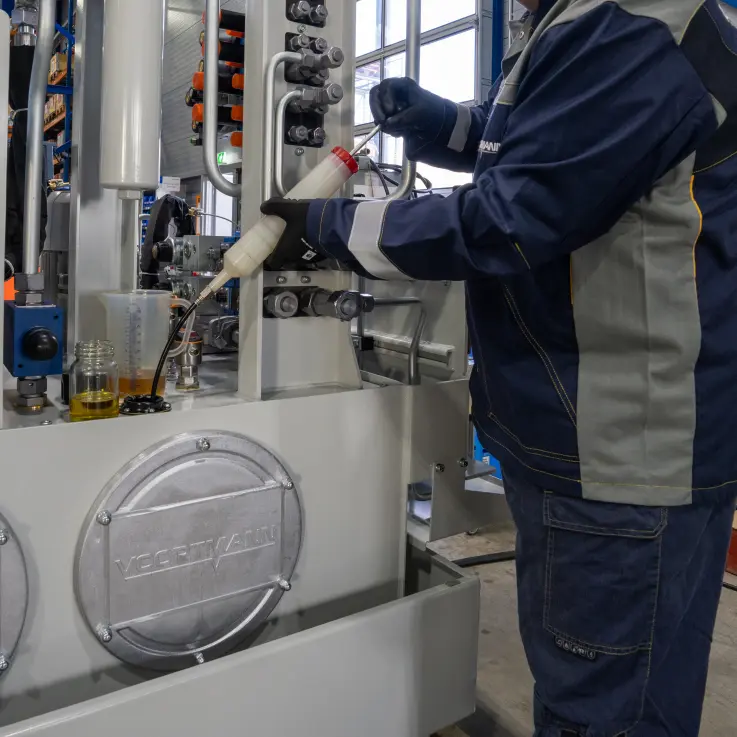



The experts at VOORTMANN GmbH & Co. KG Steuerungstechnik, a certified partner of Bosch Rexroth, emphasize the central importance of holistic oil management for the longevity and efficiency of hydraulic systems. Effective oil management minimizes wear, avoids unplanned downtime, and maximizes the service life of components. This involves much more than just regular laboratory analyses.
An often underestimated aspect of oil management is the initial filling of the hydraulic system. Voortmann emphasizes that this is where the foundation for optimal oil quality is laid. Freshly delivered hydraulic oil must be filtered of impurities using a filter pump before being poured into the tank. The direct introduction of unfiltered oil, even if it is new, poses the risk of contamination, which can cause future problems.
Compliance with the oil cleanliness classes specified by the manufacturer according to ISO 4406 or NAS 1638 is essential. Modern hydraulic components, especially proportional and servo valves and axial piston pumps, are manufactured to extremely tight tolerances and are extremely sensitive to particle contamination. Even a single deterioration in the oil cleanliness class means a doubling of the particle concentration in the oil. This can lead to increased wear, malfunctions, reduced control quality, and ultimately component failure and associated plant downtime. Even minor material abrasion within components can significantly reduce service life if the oil cleanliness is insufficient.

Service technician performing oil analysis (Image source: VOORTMANN GmbH & Co. KG)
When retrofitting, replacing components, or modernizing hydraulic systems, a reassessment of oil management is essential. Manufacturers' cleanliness class recommendations depend on various factors such as oil pressure, filter mesh, and pump design. If any of these parameters change, the target oil cleanliness must also be adjusted. For example, for an axial piston pump, the recommended minimum target cleanliness class can increase from 19/17/17 at a pressure of up to 140 bar to 16/14/11 at over 200 bar. Voortmann therefore strongly recommends consulting experts for such adjustments to ensure optimal oil cleanliness and long-term, trouble-free operation of the system.
In addition to wear particles, there are other factors that negatively affect the quality of hydraulic oil. Excessively high temperatures accelerate oil aging and can degrade the additive packages in the oil. Water ingress, whether through condensation from the ambient air or from cleaning work in the system area, is also critical. Here, it is important to distinguish between water saturation (expressed as a percentage) and water content (measured in ppm - parts per million). Hydraulic oil can dissolve water to a certain extent without impairing functionality. Free water, on the other hand, which no longer dissolves in the oil, is harmful and must be removed at all costs. Lack of maintenance, delayed filter changes, and the natural aging of the oil also contribute to a reduction in quality.
With CytroConnect Solutions, Bosch Rexroth supports users in optimizing their oil management and predictive maintenance of their hydraulic systems. CytroConnect Monitor provides real-time visualization of component and operating conditions. CytroConnect Maintain analyzes historical data and automatically notifies the user of deviations from target values. CytroConnect Predict uses self-learning algorithms to detect anomalies early and initiate preventive maintenance measures.
We recently featured Alexander Mijnals, service specialist at VOORTMANN, as a guest in our podcast series "Industry Reimagined." In this exciting episode, the experienced fluid specialist talks about the daily challenges and common sources of error when handling hydraulic oils in industrial systems. Listen in and learn why "You can see through it – it's still good" is no substitute for professional fluid management.
Author: Alexander Mijnals, service specialist at VOORTMANN GmbH & Co. KG
Telephone: +49(2835)9233-622
Rexroth LinkedIn profile:
